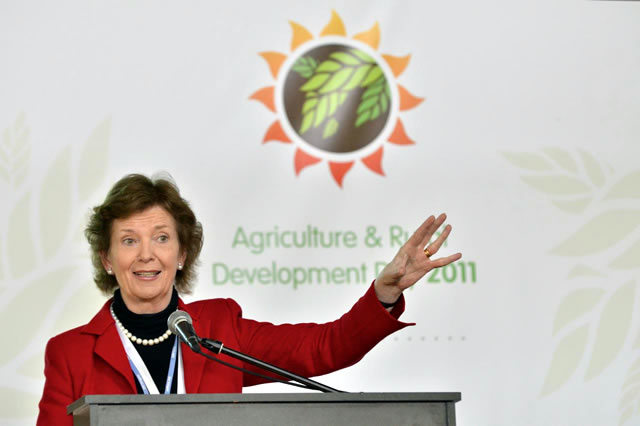Delivering a keynote presentation on Agriculture and Rural Development Day held at Durban University of Technology today, Mary Robinson said: “While the current text is blocked due to linked agenda items on bunker fuels and issues around trade
Delivering a keynote presentation [10 pages, 360kb] at the Agriculture and Rural Development Day held at the Durban University of Technology today (Sunday 3 December 2011), Mary Robinson, President of the Mary Robinson Foundation – Climate Justice said:
“While the current text is blocked due to linked agenda items on bunker fuels and issues around trade, this COP must deliver action on the links between climate change and food and nutrition security. I hope that a high-level decision can be agreed which acknowledges the importance of agriculture to Africa and the rest of the world and creates space in the Convention for further work to be done.”
Mrs Robinson was speaking as part of a high-level panel organised as part of Agriculture and Rural Development Day (ARDD) 2011 by the CGIAR Program on Climate Change, Agriculture and Food Security (CCAFS), the Food, Agriculture and Natural Resources Policy Analysis Network (FANRPAN) Regional Office in South Africa and the World Bank. The event highlighted the importance of climate smart agriculture and the need to address food security and agriculture in the climate change negotiations.
She said: “A positive development is the renewed focus on the key role that agriculture plays in addressing food security and the search for innovative approaches to agriculture, including Climate Smart Agriculture.”
Highlighting the theme of the event, Advancing rural development for Africa’s smallholder farmers, Mrs Robinson said: “We know that up to 75% of people living in developing countries rely on agriculture for their livelihoods – and that over 90% of Africa’s agricultural production comes from small-scale production. Many of these farmers are women, who play a critical role in the food and nutrition security and are responsible for growing, buying selling and cooking the food. Between 60 and 80% of the food produced in most developing countries is produced by women. In sub-Saharan Africa the figure is between 80 and 90%, yet women own less than 2% of the land.”
She said: “A situation where almost a billion people go hungry every day, where a further billion are malnourished, is an affront to us all. Progress here in Durban could build a strong momentum to put justice and equity at the heart of international responses to climate change as we prepare for the 20th anniversary of the Rio Earth Summit next June. We should not let this opportunity pass.”
Related:


